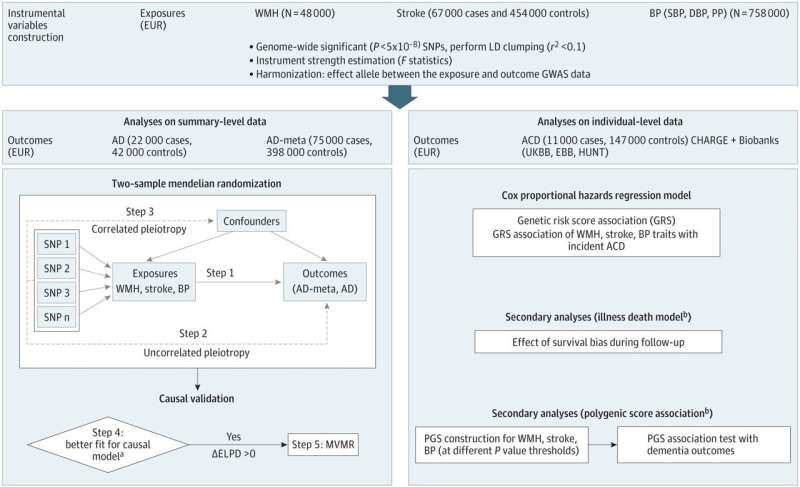This article has been reviewed according to Science X's editorial process and policies. Editors have highlighted the following attributes while ensuring the content's credibility:
fact-checked
peer-reviewed publication
trusted source
proofread
Study finds causal evidence tying cerebral small-vessel disease to Alzheimer's and dementia

Research led in part by The University of Texas Health Science Center at San Antonio (UT Health San Antonio) finds that the most common cerebral small-vessel disease feature seen in brain magnetic resonance imaging is a primary vascular factor associated with dementia risk.
Results of the major international study emphasize the significance of that feature, known as white matter hyperintensity (WMH) burden, in preventive strategies for dementia.
"Our findings provide converging evidence that WMH is a major vascular factor associated with dementia risk," said Muralidharan Sargurupremraj, Ph.D., an assistant professor at the Glenn Biggs Institute for Alzheimer's and Neurodegenerative Diseases at UT Health San Antonio. "They also support WMH as a surrogate marker for clinical trials to prevent dementia by controlling vascular risk."
Sargurupremraj is the first and co-corresponding author of the research, titled, "Genetic Complexities of Cerebral Small Vessel Disease, Blood Pressure, and Dementia," published May 22 in JAMA Network Open.
The study notes that with increasing life expectancy, the prevalence of dementia is expected to reach 75 million people globally by 2030, which makes devising strategies to prevent or delay its occurrence a major public health priority. The scientific community widely recognizes that most dementia cases, including Alzheimer's disease, are related to a combination of vascular and neurodegenerative lesions.
And cerebral small-vessel disease is thought to be the main underlying contribution to cognitive decline and dementia, with nearly half of dementia cases showing both Alzheimer's and cerebral small-vessel disease neuropathologic characteristics, the study notes.
Still, while observational studies had shown evidence of an association between white matter hyperintensity burden and increased risk of stroke and dementia, causal evidence had been limited. White matter hyperintensities are lesions in the brain that show up as areas of increased brightness in T2-weighted magnetic resonance imaging.
In the new study, researchers were able to provide evidence of a causal link between vascular traits and Alzheimer's disease, using genetic instrument variable analyses known as Mendelian randomization—a method that leverages the natural randomization of genetic alleles to test how differences in the genetic effect on modifiable exposure influence disease risk.
Specifically, in a two-year analysis ending July 24, 2022, and using Alzheimer's disease genome-wide association studies of up to 75,000 European dementia cases, they found causal evidence of an association of larger WMH burden with increased risk of the disease, accounting for pulse-pressure effects.
The study also highlighted the importance of combining several complementary epidemiological approaches and data types, and of accounting for caveats of instrumental variable analyses when exploring the impact of vascular traits on late-onset diseases like dementia.
"As vascular disease is a treatable contributor to dementia risk, our findings have broad significance for prevention strategies of Alzheimer's and dementia as a whole," Sargurupremraj concluded.
The researchers advise future studies to examine whether their findings can be generalized to non-European populations.
More information: Muralidharan Sargurupremraj et al, Genetic Complexities of Cerebral Small Vessel Disease, Blood Pressure, and Dementia, JAMA Network Open (2024). DOI: 10.1001/jamanetworkopen.2024.12824




















